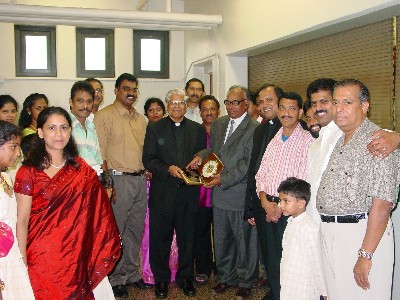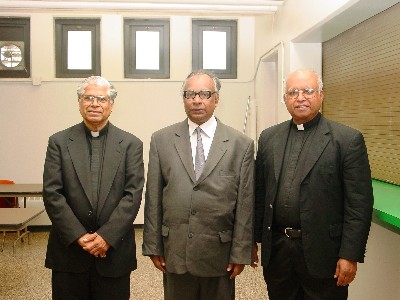 |
FIRST INTERNATIONAL CONFERENCE ON THE HISTORY OF EARLY CHRISTIANITY IN INDIA
| The first international conference on the history of early Christianity in India from the advent of St. Thomas to Vasco de Gama was convened in New York from 13-16 August 2005. This Conference was organized jointly by the Institute of Asian Studies [IAS], Chennai, India; The Centre for the Study of Christian Literature and Culture in Indian Languages [CSCLC], Chennai, India; and few other academic centre of advanced research in other countries. Institute of Asian Studies [IAS] is a spiritual organization established in 1982 centered at Tiruvanmiyur in Tamil Nadu, India, conceived with the objective of strengthening the cultural ties between India and other Asian nations. Currently it is grown to become one of India's premier indological research and publication institutes involved in study and research in the ancient literary and cultural traditions of Asia promoting inter-disciplinary investigation of the literary and cultural facets of pan-Asian culture. The Institute of Asian Studies has in recent years attracted research scholars from all over Asia, Europe and America, enabling them to conduct their designated research projects in Asian languages and literatures under one roof with support facilities, a faculty of senior academicians, digital interconnectivity with the global village community and ideal accessibility to the heartland of South Indian culture. The Center for the Study of Christian Literature and Culture in Indian Languages [CSCLC] is a registered public trust founded with the aim of promoting academic research on various aspects of Christian literature and culture in the regional languages of India. It is based on the campus of the Institute of Asian Studies, Chennai. The CSCLC undertakes research projects aiming to systematically document the history and achievements of Christianity on Indian soil beginning from the time of St. Thomas to the present day. |
 | Prof. George Menacherry had visited U.S. to attend this International Seminar held at the Concordia University, New York. Prof. Menacherry was honoured by the New Jersy Community for the services rendered by him to spread knowledge about India and Indian Christianity - esp. the history and culture of the Nazranies - in foreign countries. V. Rev. Dr. George presented him a plaque on behalf of the community. Madathipparampil, the Vicar General of the Syro-Malabar Diocese of Chicago. Fr. Joy Alappatt, Administrator of "Our Lady of Sorrows" church, Garfield and Fr. John, former principal of Koothuparambu College were among those who spoke on the occasion. |
| Prof. George Menachery is a freelance Indian Journalist and Editor of the St. Thomas Christian Encyclopedia of India and the Indian Church History Classics. After teaching university classes for thirty years, he gave up the job as Head of the Department of Post-Graduate Teaching in order to concentrate on research and publication. SARAS [South Asia Research Assistance Services] provides information and research assistance for topics dealing with India in particular and South Asia in general. He has to his credit a large number of publications, research papers, articles, radio talks and TV programmes. His research activities and lectures have taken him to more than 20 countries in 4 continents. |
 |  |
The history of Christianity in India is traceable from the advent of St. Thomas during the middle of the first century, precisely A.D. 52. As the secular written history does not give any clues of the origin of Christianity in India due to the fact that ancient historical documents are blended with traditions and fictional elements. Mission of St. Thomas in Kerala during the first century was always a subject of controversy for a long time. There are two distinct schools of thoughts regarding the origin of Christianity in India: viz. By the first century mission work of apostles of Jesus Christ St. Thomas & St. Bartholomew or through the merchants and the missionaries of East Syrian or Persian Church at later centuries. However the traditions of Malankara Christians strongly believe that St. Thomas arrived at the Malabar Coast in A.D. 52 converted Hindus of Kerala and established Christianity. The Malabar tradition which associates St. Thomas with Palaiyur, Parur, Kokkamangalam and Niranam is not contradicting with any other tradition. Other tradition of the West cost Christianity [Kalyan, Vasai Area near Mumbai] believes that origin is by the proselytizing of St. Bartholomew. The writings in the 'Acts of Judas Thomas' and 'Teaching of the Apostles', though they are shrouded with doubt of its connection with Gnostic thoughts and a number of stray references in the writings of Origen, Eusebius of Caesarea, Rufinus of Aquileia, Socrates, Ephrem of Nisibis, Gregory Nizianzus, Ambrose and Jerome corroborate the Indian traditional beliefs.
With the molding of the ancient historical sketch of Kerala and various other place in India from the modern archeological excavations give ample evidences both internal and external to testify to the existence of early Christianity in India from the period of St. Thomas. Christianity in the Tamilnadu during this phase of early history was a very potential force and its ethics and other theological codes find powerful expression even in secular Tamil Classics like Tirukkural and Naladiyar.
The aim of the present conference was to establish the existence of early Christianity in Indian soil with objective and well-documented evidences and to study its strong impact on medieval and classical India until the advent of Vasco de Gama whose epoch - making visit inaugurated a new chapter in the cultural, and political history of this great nation. The organizers are quite hopeful that the reconstruction of the early Christianity in India will shed new light on the history of Indian Philosophy and Indian Culture in general and this will give new orientation and new perspective to our understanding of the classical and medieval culture and civilization.
Delegates who are selected and invited from various organizations all over the world and had done intensive study and contributions in various related topics presented papers broadly in following topic categories.
A Committee constituted consisting of 12 representatives from various countries and Organizations all over the world offered guidelines and suggestions in the successful conduct of the conference schedules. There were cultural programmes arranged in the evenings

As time goes on more and more people begin to realise the ancient glory and trade leadership of Muziris which could be Pattanam, or kodungallur, or parur or another location in the vicinity , because all these places are in a circle of say 10 kms radius. hence instead of claiming one place or other as ancient Muziris what has to be done by representatives of Kodungallur (cranganore0, of Parur, or Pattanam is to make a united move to project the importance of the whole area, so as to gain world recognition and the attention and interest of bodies like the UNESCO to further research, excavations, preservation, restoration &c.Prof. George Menachery
ReplyDelete